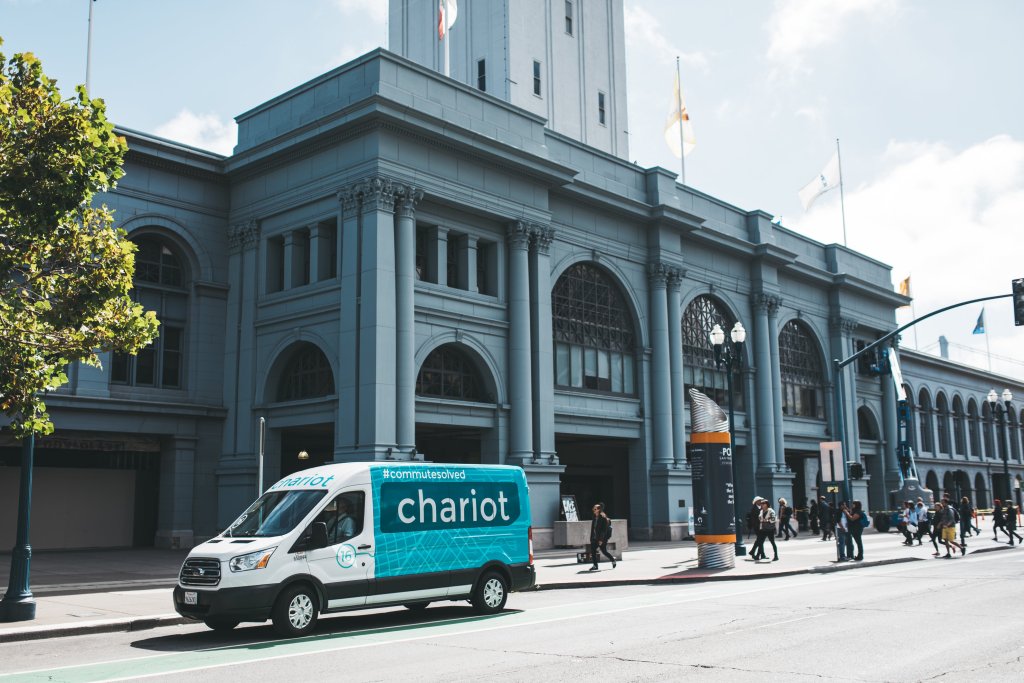In the beginning, there were three.
There was Leap Transit, the Andreessen Horowitz-backed bus startup stocked with Blue Bottle Coffee and furnished with plush stool seating for morning and evening commuters.
Then there was the Nightschool’s nostalgic take with off-duty schoolbuses for late-night transport between the East Bay and San Francisco after the region’s commuter rail system BART shut down for the night.
Then there was Chariot, a no frills, functional take that founder Ali Vahabzadeh set up in about 10 weeks with commuter vans. After talking to scores of MUNI and Uber users for three weeks last January, Vahabzadeh decided to launch a service that spring. Commuters told him they were frustrated with the capacity problems both systems faced during peak hours.
So Vahabzadeh rented vans, hired drivers, got commercial vanpool insurance, a gasoline line of credit, procured parking, built a basic website, and started taking credit card payments — all within a few months.
“Our service is completely vertically integrated,” he said. “We source the vans, drivers, gas and insurance and we actually hire our own drivers as opposed to making them 1099 contractors.”
More than a year and a half later, Chariot is the only bus startup left in San Francisco. They’re doing at least 35,000 rides to date 40,000 rides per month and have gotten the average price down to $4 per ride with many customers using commuter benefits.
The other two bus startups got embroiled in regulatory issues and ended up in the deadpool. Leap faced a cease-and-desist from the California Public Utilities Commission when it started operating before it had an official licenses and came under media scrutiny for not having disability access. Nightschool’s model, where it leased the buses instead of owning and operating them outright, also put it into legal gray area at a time when it didn’t have enough venture capital to persist through the process.
Vahabzadeh stressed that a key point of Chariot’s survival has been that the company has been above-board with the law from day one.
“They haven’t cowboy-ed it,” said San Francisco supervisor Scott Wiener, a mass transit advocate who recently pushed for a master subway plan for the city. “They’ve been good about taking feedback and making sure they’re complying with the law. I’m a fan and think that private transportation options and rideshares have a significant role to play in making us a transit-first city.”
After their initial flagship route through the Marina and Financial District, Chariot added bus lines out to the Western side of the city and through the Haight-Ashbury neighborhood.
Because Chariot is a consumer web and mobile startup with a direct relationship to its users through an app, the company can flexibly add or take down routes based on consumer feedback. They’ve crowdsourced ideas for routes from users through Tilt, another YC-backed crowdfunding company.

“We’ll only launch certain routes if ‘X’ numbers of users sign-up and provide their credit card details. Once we reach a certain number, their credit cards will get charged for the first monthly pass. If it doesn’t Tilt, nothing happens. We think this is a great way to take risk off our tables and get the community involved in putting together better commuting options for themselves.”
They can also quickly remove under-performing bus stops or routes. For example, the startup took down several Cole Valley stops about a month after launching.
This is a totally different process than the city’s public transit system, which handles orders of magnitude more volume than Chariot with 700,000 passenger boardings per day. On the one hand, transit planning is painfully slow. It’s taken more than a decade and a half to discuss and plan Bus Rapid Transit routes on Geary and South Van Ness, for example.
Bus Rapid Transit (or BRT) produces routes at faster speeds because they involve specially-designed bus stops and exclusive lanes. San Francisco’s system currently operates at a speed of 8.1 miles per hour. It’s the slowest major urban transit system in the country, and the most expensive per mile to operate.
Latin American cities like Mexico City and Bogota, which have been much faster to adopt BRT than San Francisco, rely heavily on it. But San Francisco has been slow partly because merchants keep objecting to losing parking spaces in front of their shops. A few months ago, dozens of residents along a proposed BRT route project objected to having 200 trees replaced to make way for the bus line, a $158.8 million project.
On the other hand, the MTA and MUNI won’t quickly shut down bus stops if there isn’t enough demand, which could leave lower-income or more vulnerable residents hanging. A primary concern for transit officials running public systems, unlike those running private companies, is equity and accessibility.
This isn’t to say that Chariot intends to crowd out MUNI. It’s more to say that public systems and private bus startups have different approaches to route-planning and managing customer relationships, and that they might be complementary. In fact, Chariot could one day be a vendor to public systems with its consumer-facing apps and route-planning and management software.

Yet this hasn’t stopped a worthy discussion that is politically sensitive at times about whether private transit startups will foment disinvestment from public systems, much as the rise of the private automobile in the mid-20th century undermined subway and mass transit systems decades ago.
In the history of California, transportation has served as a potent visual symbol of power, access and then, exclusion.
When the railroad tracks were laid across the state a decade after the 1849 Gold Rush, Leland Stanford’s railroad company Southern Pacific was memorably iconized in Frank Norris’ novel as the Octopus, a beast with tentacles in everything from the farms of Central California to the Gilded Age mansions on top of Nob Hill.
The progressive reformer who broke the hold of Southern Pacific on California, Hiram Johnson, campaigned for governor using the newly-invented private automobile as a symbol of his clean break from the state government’s corrupt past.
Then, of course, the Google Bus became a potent symbol of income inequality and displacement in San Francisco last year for affordable housing and tenants rights activists.
Wiener said he didn’t see Chariot and other ride-sharing services eating into MUNI or MTA’s load.
“I hear that concern and people articulate it, but I just don’t see it,” Wiener said, pointing to how voters passed a $500 million transportation bond last November. “Even if you add up all of the shuttles and all of the rideshares and every single private option, it’s dwarfed by the number of people who rely on public transit.”
Then, of course, plenty of companies are rapidly experimenting with cars from Google to Tesla to Uber and probably Apple.
If startups and tech giants are planning for the future of the car, then who is doing the same for larger-format vehicles and shared transit?






























Comment